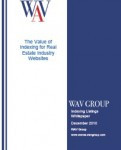
WAV Group is proud to release this property indexing white paper to explain NAR’s policy on indexing listings. The paper provides an overview of indexing, the process used by search engines to catalog information on the internet. Click the image to download the paper for free.
In order for MLSs to enforce IDX rules and regulations, they must understand indexing. Furthermore, anyone operating an IDX website needs to understand indexing and the advantages that it offers to search engine optimization and online competition.
Non-IDX property search websites like Trulia, realtor.com and others have been indexing listings for years, and as a result – they have a significant advantage over brokers in online search results. The typical broker website may only have a few hundred pages of content if the listings are not indexed. In a major MLS market, that same broker may have 100,000 of pages of content if the IDX listings on their website are indexed.
WAV Group suggests that allowing indexing of all listings on all IDX websites will provide a great benefit to large brokers today. It will provide a lesser, but still significant benefit to smaller brokers today. However, the significance of indexing will deteriorate as the practice if indexing becomes widespread. Search Engines consider duplicate data as bad data. To fix this issue, further consideration of indexing is needed by the industry. Here are three considerations:
First Consideration: only allow the listing broker to index his or her own listings. Our reasoning is simple.
1. The listing broker is legally responsible for the listing content
2. The listing broker and its agent collected the listing content and created a unique and aggregate piece of work in the MLS system.
3. The listing broker and its agent curated the listing content from inception to sale.
Second Consideration: only allow the buyer’s broker representative to index sold listings. In so far as the seller’s representative is the responsible party for the active listing data, the buyer’s representative is the logical responsible party for the sold listing data, and its accuracy.
Third Consideration: only allow indexing on a limited number of fields that satisfy the need of a recognized search engine to direct consumers to the source of the indexed data. Presumably only a short list of fields is necessary for this purpose.
Let the indexing begin! On your marks, get set, go! See you at the finish line in a few years as this shakes out.




